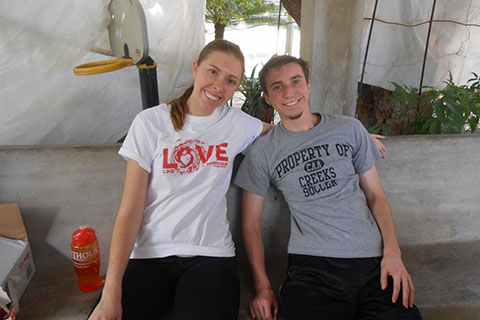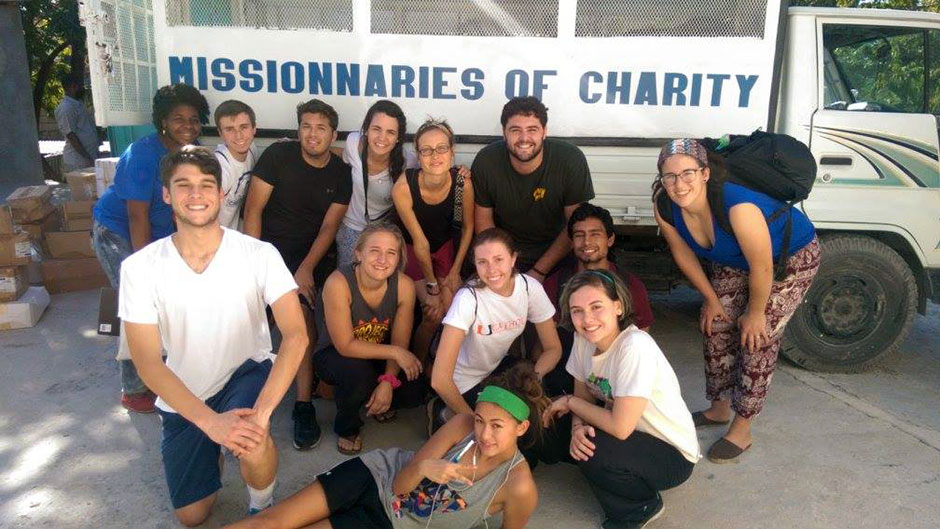The mid-December afternoon in Port-au-Prince brought with it a sweltering heat that loitered over Haiti’s capital as we made our way to the wound clinic.
We swerved to avoid large piles of garbage that spilled into traffic lanes, until we arrived at the makeshift hospital where 50 people already lined up outside. Their injuries ranged from knife wounds to advanced breast cancer.
Soon, an 11-year-old girl trudged in with an ugly scrape on her right shoulder. She held her breath and grimaced as I gingerly cleaned the wound. As soon as I applied the antiseptic cream and secured the gauze pad, we both audibly exhaled at the same time, Woo-o-o. We laughed at our simultaneous release of anxiety, knowing we had just shared the universal sound of relief. I felt small tears form at the corner of my eyes as her mother led her back onto the chaotic street in front of the clinic.
To me, that young girl represents all of Haiti – wounded but with great potential for healing and a bright future. My time in Haiti with Catholic Campus Ministry at UM has completely changed my perspective of the nation making up the Western side of the island of Hispaniola. As the country continues through political turmoil (The December 2015 election has been postponed), beacons of light shine in the form of people making daily sacrifices to help.
It was the shortest day of the year. Still, in the early hours of the dawn, the workers arrived to the Missionaries of Charity compound at 31 Delmas. Nurses switched shifts in the four rooms of the children’s hospital and men came to help with the morning labor. On this day, hundreds of people began to pile into the compound to wait in the large open-air chapel. It was distribution day.
 The team from Miami – which included six students from the University of Miami, including my brother Rick, a freshman – took their stations along the assembly line. Groups of women, 30 at a time, passed through to receive large metal bowls of rice, beans, coffee, sugar, tooth paste, tooth brushes, and medicated soap. It was a three-hour event, and one that occurred at least twice a week at the compound.
The team from Miami – which included six students from the University of Miami, including my brother Rick, a freshman – took their stations along the assembly line. Groups of women, 30 at a time, passed through to receive large metal bowls of rice, beans, coffee, sugar, tooth paste, tooth brushes, and medicated soap. It was a three-hour event, and one that occurred at least twice a week at the compound.
View the Haiti Special Report about UM’s work in Haiti.
In 136 countries around the world, the Missionaries of Charity sisters, founded in 1950 by Blessed Mother Teresa of Calcutta, work six days a week at the service of the poorest of the poor. With the population of Port-au-Prince estimated at 1 million people, it was fascinating to find out how these people were chosen to receive the donated goods.
In Port-au-Prince, a few of the sisters go out into the city and distribute between four and six hundred tiny numbered tickets to the poorest of the poor. They include people sitting in the gutter or begging on street corners, with no means to provide for their families other than what they can scavenge or what is given to them by others. While Missionaries of Charity are from all over the world, many of the sisters at 31 Delmas speak Malay. They carefully code the numbered tickets to the recipients to ensure that none is duplicated, nor counterfeited, in their language, which only they can understand. They keep entire books of records.
The most amazing aspect of distribution days is that all of the goods – food, soap, and hygiene products – are donated. My team members and I quickly filled the metal bowls as the next group of people stood waiting to receive their share. A few of the men who worked at the compound were unloading heavy bags of beans from a cargo container that had arrived from Miami the previous day.
As one of the bags traveled down the line, a small hole in the woven plastic suddenly burst wide open and half the contents spilled onto the ground. I grabbed the bag, tied the hole shut, and prepared to continue with the distribution. In my mind I imagined that we would sweep the beans up later, but the men who worked in the compound immediately bent down on their hands and knees to pick up every individual bean that had fallen. For a few seconds I couldn’t move, but then I bent down to help the men until we had all the beans collected.
In Haiti, food is the most valuable commodity. As a mission team, we lived off one large meal a day (usually pasta with marinara sauce or rice and beans), and peanut butter sandwiches. Though this was a huge sacrifice, especially for the five men on the team, it allowed us to enter into the mentality that food is precious and to serve the people in Haiti with greater zeal.
One of our last stops of the trip was the Home for the Sick and Dying, located at another Missionaries of Charity compound on the other side of Port-au-Prince. We piled into a truck with a guitar and Creole song sheets and headed to the home, where men and women dying from tuberculosis, HIV/AIDS, or cancer too far advanced to be treated, awaited us. The home was situated in an urban valley; the wind blew strongly across the compound and in the hallways. Many of the patients sat outside to enjoy the cool breeze.
Ramon started playing softly on the guitar amidst a circle of men in blue hospital gowns. I began to sing, first quietly and then louder as the men began to join in. Priye ak lafwa, rete tann… The beautiful Creole lyrics drifted into the room where the other patients rested. A sense of hope and peace washed over me. We stood up and, along with our other team members, walked in between the beds singing and probably butchering the lyrics of translated songs like O’ Come All Ye Faithful and Jingle Bells.
Some people smiled, some closed their eyes and leaned back in bed, some cried out ready to meet life after death. We sang with the peace in our hearts as a gift to all of them, and in return we learned what it means to be in the same room as death. I do not understand why most hospices in America give each patient his or her own room. When I am dying I want to be with other people. I want to share in their struggles. For me, that is what Haiti is all about too – to share in the struggle. The girl at the wound clinic, the men in the compound picking up the beans, the patients at the Home for the Dying, and everyone on my mission team, we all have our struggles, but the burden can be lightened, if shared.
Renee Reneau is a senior at the University of Miami and works part-time with University Communications.

